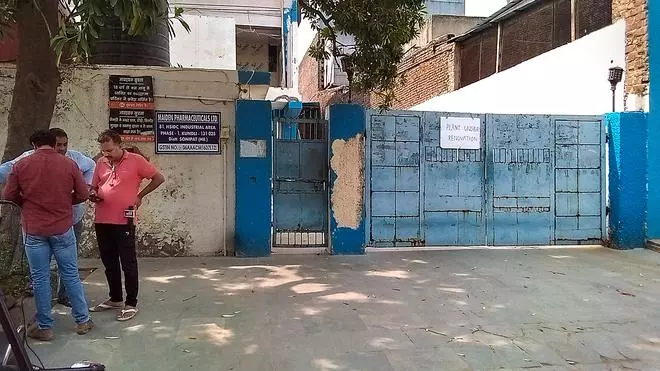The country’s drug regulator has proposed testing cough syrups in government laboratories before they are exported, a media outlet reported on Tuesday, after Indian-made syrups were linked to dozens of deaths in Gambia and Uzbekistan last year.
The Health Ministry received the proposal from the Central Drugs Standard Control Organisation (CDSCO) this month and is considering it, the news website quoted an unidentified Ministry official as saying.
"The proposal is to test the finished goods at government labs before exporting," the official told News18.com.
The ministry did not immediately respond to a request for comment.

File picture: Maiden Pharmaceuticals Ltd’s factory in Sonepat district, on October 6, 2022. A probe has been initiated by the drug regulator after WHO issued an alert saying cough syrups manufactured by the Indian firm could potentially be linked to the death of children in Gambia.
The official said the syrups could be tested at various laboratories run by the federal government or states.
The CDSCO has also proposed making it mandatory for exporters to produce a "certificate of analysis" of batches exported from an approved laboratory, the news outlet reported.
Listen: Did an Indian pharma cough syrup turn into a kids’ killer in the Gambia?
The $41-billion pharmaceutical industry received a major jolt last year when cough syrups made by two companies based near New Delhi were linked to the deaths of at least 70 children in Gambia and 19 in Uzbekistan.
The World Health Organization said last year that Maiden Pharmaceuticals Ltd's syrups, exported to Gambia, contained lethal toxins ethylene glycol (EG) and diethylene glycol (DEG) – used in car brake fluid.
Uzbekistan said in December that children died there after taking cough syrup made by Marion Biotech, which were contaminated with EG or DEG.
Both companies have denied the accusations.
The ingredients can be used by unscrupulous actors as a substitute for propylene glycol, which is a key base of syrupy medicines – because they can cost much less.
Also read: WHO says contaminated cough syrup made in India found in Western Pacific
India's drugs regulator told the WHO in December that the propylene glycol used by both Maiden and Marion came from two separate Delhi-based suppliers.





Comments
Comments have to be in English, and in full sentences. They cannot be abusive or personal. Please abide by our community guidelines for posting your comments.
We have migrated to a new commenting platform. If you are already a registered user of TheHindu Businessline and logged in, you may continue to engage with our articles. If you do not have an account please register and login to post comments. Users can access their older comments by logging into their accounts on Vuukle.